Intel Core i7-4790K (Devil's Canyon) Review
Manufacturer: IntelUK price (as reviewed): £259.99 (inc VAT)
US price (as reviewed): $339.99 (ex tax)
While owners of Sandy Bridge CPUs such as the Core i5-2500K might be reveling in the fact their purchases were sound ones (we certainly wouldn't disagree here), the fact remains that Intel has, slowly but surely, ramped up the performance either by clock speed bumps or architectural tweaks in the ticks and tocks of its release cycles.
As such, combined with the socket switch from LGA1155 to LGA1150 this time last year, it's now time to look at upgrades if you own an Ivy Bridge or Sandy Bridge CPU and want more performance.
Indeed, Intel's focus in much of its press decks has been how much faster the new Core i7-4790K that we're looking at today is, compared to the venerable Core i7-2700K (the 2600K's refresh).
It claims a figure of 30 percent improvement in Cinebench R11.5, for example, so clearly if this is true, Intel's latest batch of LGA1150 CPUs should be worth your attention. We're still waiting on a sample of the Core i5-4690K, but the top end Core i7-4790K and the Pentium Anniversary Edition AKA Pentium G3258 are now here and you can expect a review of the latter shortly.
We've already covered much of the tweaking that's gone on as we've been fed a steady trickle of information and rumours the last few months too.
You can read the lowdown on the new Z97 chipset here, but to recap, Z87 motherboards can indeed support the new CPUs, although they may need a BIOS update and will also need to meet the slightly higher power requirements of the two new K-series CPUs.
The Core i7-4790K, for example, has a TDP of 88W compared to the Core i7-4770K's 84W, with the same being true of the Core i5-4670K versus the new Core i5-4690K.
There are three key features of the Core i7-4790K that we're interested in, though, and all three have certainly been grabbing headlines.
Firstly, it's Intel's first 4GHz out-of-the-box desktop CPU and it actually Turbo-Boosts to 4.4GHz, giving it quite an advantage in clock speed over its predecessor, the Core i7-4770K, which only boosted to 3.9GHz. This is somewhat of an irrelevant fact, though, as you'd be a little mad to buy a K-series CPU and run it at default speeds.
This brings us onto overclocking and the two other features are aimed squarely at enthusiasts out there. Intel has supposedly fixed the high temperature issue at high clock speeds - something that Ivy Bridge and Haswell owners will be all too familiar with. Intel has added a Polymer Thermal Interface Material (NGPTIM), which we hope will alleviate the toasty temperatures we've seen above 4.4GHz. There are also additional capacitors on the underside of the CPU - a considerable number in fact - designed to smooth out power delivery. Today we're looking at the Core i7-4790K but we'll also see whether Z87 boards fare just as well as the Z97-based Asus Maximus VII Hero we used for testing in a future article.
Above left - the new Core i7-4790K with its extra capacitors - on the right is the Core i7-4770K - Click to enlarge
Apart from these additions, there's very little between the Core i7-4770K and Core i7-4790K. Both use Intel's HD 4600 graphics clocked at 1,250MHz, offer hyper-threading and 8MB L3 cache. As we say, the only major differences are the extra default and Turbo-Boosted frequencies alongside the enhanced thermal interface material and power delivery. However, the latter two could clearly improve overclocking quite considerably so they're arguably just as exciting as an architectural tweak or the use of a smaller manufacturing process.
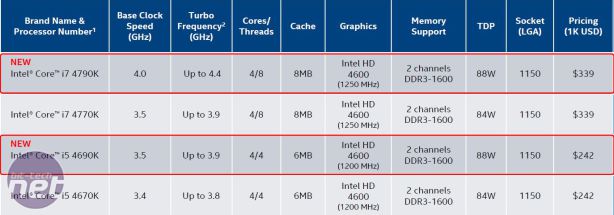
Click to enlarge
Specifications
- Frequency 4GHz (4.4GHz Turbo-boost)
- Core Devil's Canyon (Haswell architecture)
- Manufacturing process 22nm
- Number of cores 4 physical, 4 virtual
- Cache L1: 8 x 32KB, L2 4 x 256KB, L3 8MB (shared)
- Memory controller Dual-channel DDR3, up to 1,600MHz
- Packaging LGA1150
- Thermal design power (TDP) 88W
- GPU Intel HD 4600
- Features Hyper-Threading, SSE, SSE2, SSE3, SSSE3, SSE4, SSE4.2, EM64T, F16C, Quick Sync Video, Turbo Boost 2.0

MSI MPG Velox 100R Chassis Review
October 14 2021 | 15:04


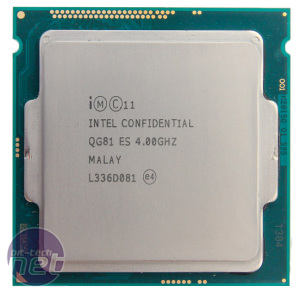
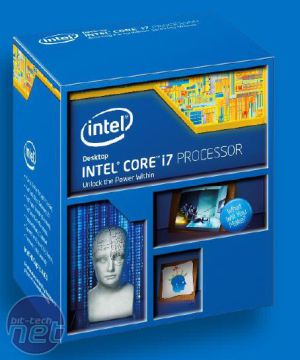
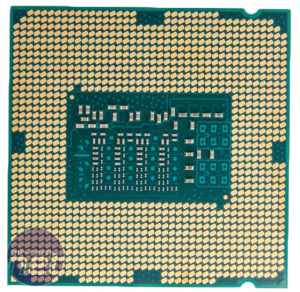
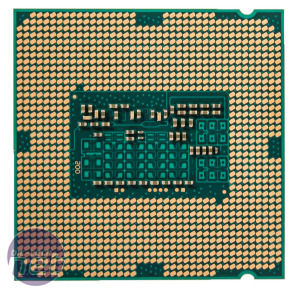







Want to comment? Please log in.